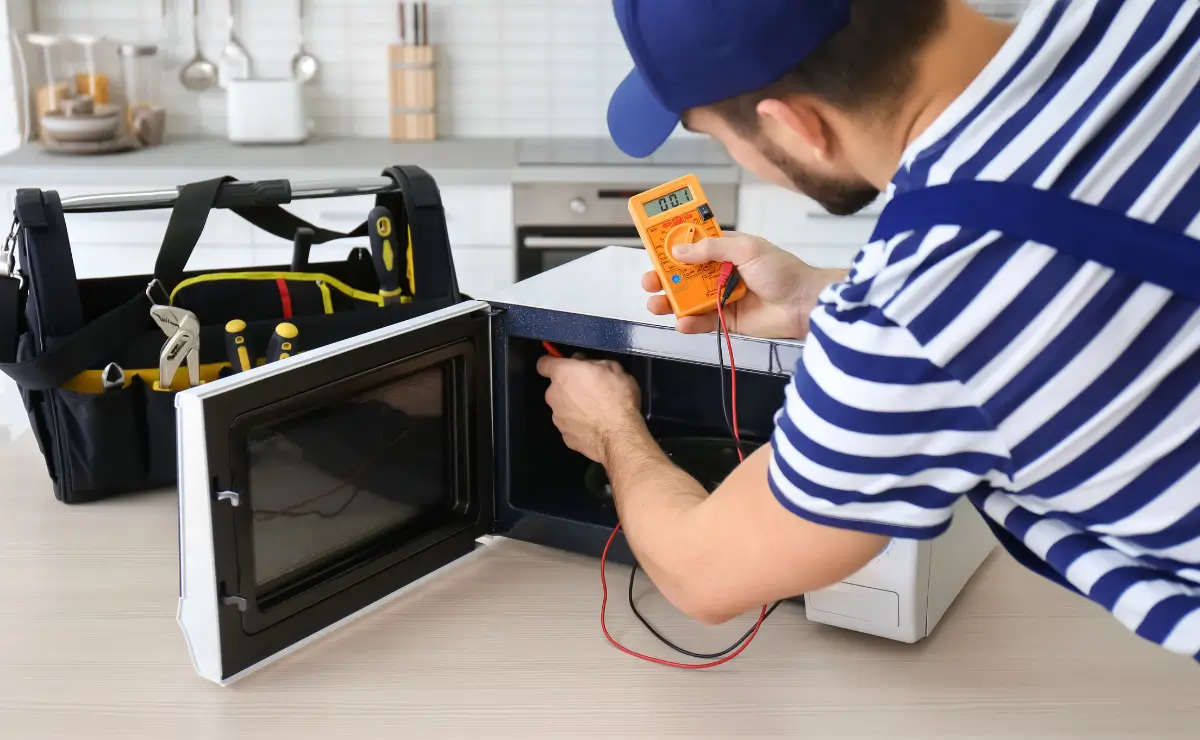Looking for washer repair in Waterloo? If your washing machine stops working, leaks water, or makes unusual noises, it can disrupt your daily routine....
How To Handle Strange Microwave Noises
The microwave oven is one of the most commonly used household appliances for quickly and conveniently heating food in our daily lives. However, in some cases, strange sounds coming from the oven can cause concern among users. These sounds may appear in different forms, such as crackling, buzzing, clicking, or metallic noises. Understanding the causes of these sounds and taking appropriate measures is very important for the longevity and safety of the device. Sometimes these sounds are simply due to the appliance being dirty, while at other times they may indicate serious technical malfunctions. Therefore, it is important to correctly analyze the sound and seek technical support if necessary. Whether the cause is superficial or technical, we will provide you with practical information to resolve each situation.
How to determine the causes of the sounds?
Identifying the cause of the strange sounds coming from the microwave oven is the key step for solving the problem correctly. The type of sound and when it occurs should be observed, especially any changes during operation or while heating food. Some sounds may be related to food residues, inappropriate containers, or the turntable being misaligned. Testing the oven while empty and then with a glass of water inside can be helpful. If the cause remains unclear, a technical inspection may be required.
Timing of the sounds
Observing when the strange sounds from the microwave are heard plays a crucial role in identifying the cause of the problem. If the sound occurs immediately after the oven is turned on, it may be related to the activation of internal components. In some cases, the sound increases while the oven is operating at full power, which may indicate a malfunction in the heating system. If the noise occurs only when food is inside, it could be due to the type of container used or the physical state of the food itself. Additionally, if the noise disappears when the oven stops, this suggests that the problem only occurs during operation and is more likely related to functionality rather than a mechanical issue.
Effect of food residues and dirty parts
Food residues accumulated inside the microwave oven over time can lead to the emergence of noise. Especially around the turntable and the ring beneath it, stuck food particles can hinder rotation and create friction noises. At the same time, accumulated grease and dirt on the inner walls can interfere with the distribution of microwaves, causing strange humming or clicking sounds inside. Therefore, regular cleaning of the oven is important both hygienically and technically. During cleaning, wiping the oven gently with steam from vinegar or lemon water can be helpful.
Turntable mechanism and motor issues
If there is a problem with the rotation of the microwave’s turntable, it may result in hissing, creaking, or continuous friction sounds. This problem is often related to the rotation ring beneath the turntable being misaligned or unable to move freely due to dirt. If the issue is solely related to rotation, there is a possibility of a malfunction in the motor part. Wear and tear or lack of lubrication in the mechanical components inside the motor can cause significant noise. In such cases, the first step should be to remove the turntable, check the ring, and test whether the motor is functioning.
What are the signs of dangerous noises in a microwave oven?
Although some strange sounds are harmless, others may indicate that the microwave oven is in a dangerous condition. If the oven emits high-pitched and continuous buzzing, metallic clinking, or sounds resembling a short circuit, the device should be turned off immediately. Especially if a burning smell accompanies the sound, there may be a malfunction in the internal electronic components. The failure of parts such as the magnetron and transformer can pose a serious danger. If the light suddenly goes off while the oven is operating or if the device vibrates unusually, this is also considered a warning sign. In such cases, it is risky to use the device again, and it is essential to contact technical service. Ignoring such sound signs may pose a fire hazard at home.
Simple inspection and initial intervention methods
When strange sounds come from the microwave oven, it is possible to identify the problem through a few simple checks and interventions before immediately contacting a technician.
- Remove the rotating plate – Make sure that the plate and the ring underneath are clean and properly positioned. If there are food residues or grease build-up, this can cause friction and squeaking noises.
- Test with an empty and water-filled cup – First, run the oven empty, then place a cup of water inside and run it again, observing the difference in sound. This method helps determine whether the issue is caused by the oven itself or the contents inside.
- Check the door closure – If the door is not fully closed, noise may occur. Ensure that the door fits properly and that there are no gaps.
- Inspect internal containers – If metal or microwave-incompatible containers are used, they may cause sparks and strange noises.
- Check the ventilation and fan section – The ventilation holes and fan section at the bottom of the oven may be dusty or blocked. Check these parts visually.
- Pay attention to loose screws – Sometimes a single loose screw can cause vibration and noise during operation.
- Seek technical assistance – If the above simple methods do not help, stop using the device and contact professional technical service.
Preventive measures to protect your microwave oven
To ensure the microwave oven operates quietly and lasts a long time, it is important to take regular preventive measures. The first and most important step is keeping the internal parts of the oven clean. After each use, it is recommended to wipe the interior with a soft damp cloth to remove food residues and grease. Once a week, a deep cleaning with vinegar or lemon steam will eliminate odors and maintain the efficiency of technical components. It is essential to avoid using metal or unsuitable containers in the oven, as these can cause both noise and damage to the appliance. Regularly removing and cleaning the area under the rotating plate and ring helps prevent noise caused by friction. Every 3–6 months, the overall condition of the device and the cables should be inspected. Make sure that the ventilation openings are not blocked, as this can reduce airflow and cause the fan to make excessive noise. Avoid frequently turning the device on and off, and connect it to a stable power source as part of long-term protection. With these simple but effective habits, your microwave oven will operate both quietly and safely.





